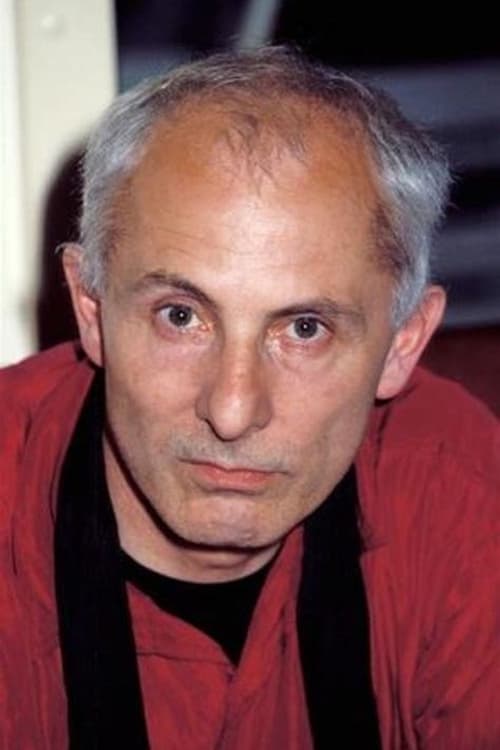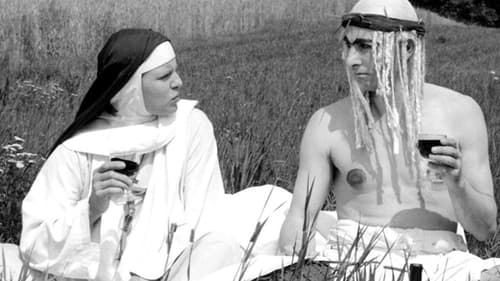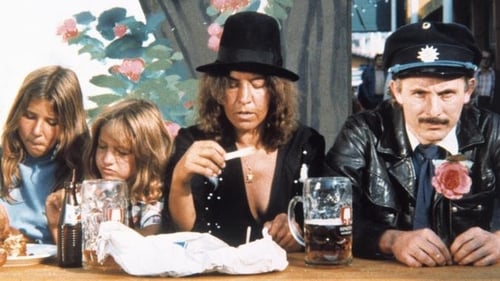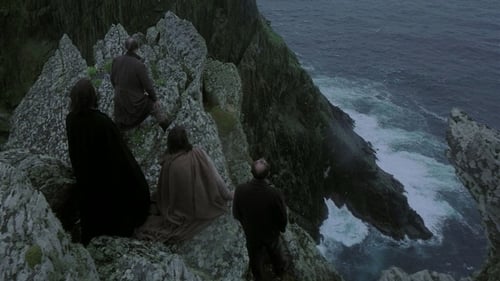
Herbert Achternbusch
Рождение : 1938-11-23, Munich, Bavaria, Germany
Смерть : 2022-01-10
История
Writer, actor, and German filmmaker born in Munich in 1938. He spent his childhood and youth in Bavaria, region which remains until today its major source of artistic inspiration. Their activity is very diverse: he has composed pieces for theater and radio scripts, translator, painter and sculptor. As different as his artistic activities is his work, and therefore difficult to classify.
In the world of cinema, his career fits approaches independent, mostly defined by a position too personalistic, provocative, that has left a deep imprint on works eminently conceptual and avant-garde, as well as suggesting in criticism of the subjects addressed (religion, society, geographical framework in which wandering people, etc.). His films just transcend the commercial sector; It is one of the most followed by seekers of original, stories of passes in areas interested in film culture. His anarchist surrealistic films are not known to a wide audience in Germany, although one of them, Das Gespenst (The Ghost), caused a scandal in 1983 because of its alleged blasphemous content. Werner Herzog, a director of the New German Cinema, based his film Heart of Glass on a story by Achternbusch.

Self

Self
Documentary about actor Josef Bierbichler.

Hick
Chancellor Helmut Kohl is to blame in Germany and has to go away without violence. The homeless Hick takes up the idea and demonstrates the abolition of Kohl.

Director
Chancellor Helmut Kohl is to blame in Germany and has to go away without violence. The homeless Hick takes up the idea and demonstrates the abolition of Kohl.

Writer
In this surrealist film director Picasso can awaken from the dead. He steals a paintings painted by himself of a couple of wealthy psychiatrists. When Picasso meets Takla Bash, a patient of the psychiatrists, Picasso falls in love. Although it is his own daughter, he remembers an incredible love affair, in which a film with a blue cow plays a role. In the majority of the paintings shown in the film are works of Herbert Achternbusch.

Picasso
In this surrealist film director Picasso can awaken from the dead. He steals a paintings painted by himself of a couple of wealthy psychiatrists. When Picasso meets Takla Bash, a patient of the psychiatrists, Picasso falls in love. Although it is his own daughter, he remembers an incredible love affair, in which a film with a blue cow plays a role. In the majority of the paintings shown in the film are works of Herbert Achternbusch.

Director
In this surrealist film director Picasso can awaken from the dead. He steals a paintings painted by himself of a couple of wealthy psychiatrists. When Picasso meets Takla Bash, a patient of the psychiatrists, Picasso falls in love. Although it is his own daughter, he remembers an incredible love affair, in which a film with a blue cow plays a role. In the majority of the paintings shown in the film are works of Herbert Achternbusch.

Hades
This German political drama from iconoclastic filmmaker Herbert Achternbusch takes a slightly askew look at neo-Nazis and the Holocaust. His non-story (a typical trait of Achternbusch films) is divided into three parts. The first introduces Hades, an eccentric half-Jewish coffin maker. Also introduced are the women in his life. The second part depicts different scenes from the city's Jewish ghetto. Included are disturbing film clips from Nazi propaganda footage that shows the naked corpses of starved Jews piled up in the streets with the insinuation that the heartless relatives of the dead would unceremoniously toss them out when they expired. In the third part, Hades is buried at sea. In between, neo-Nazis march unopposed in Munich, Hades battles skinheads, and Hades' shop is repeatedly vandalized. A scene where Hades is fascinated with death is also seen.

Director
This German political drama from iconoclastic filmmaker Herbert Achternbusch takes a slightly askew look at neo-Nazis and the Holocaust. His non-story (a typical trait of Achternbusch films) is divided into three parts. The first introduces Hades, an eccentric half-Jewish coffin maker. Also introduced are the women in his life. The second part depicts different scenes from the city's Jewish ghetto. Included are disturbing film clips from Nazi propaganda footage that shows the naked corpses of starved Jews piled up in the streets with the insinuation that the heartless relatives of the dead would unceremoniously toss them out when they expired. In the third part, Hades is buried at sea. In between, neo-Nazis march unopposed in Munich, Hades battles skinheads, and Hades' shop is repeatedly vandalized. A scene where Hades is fascinated with death is also seen.

Himself (voice)
A portrait of Attwenger, the duo from Upper Austria (Markus Binder and Hans-Peter Falkner). The attempt to unite the worlds of Austrian folk music and hip-hop has already succeeded in the music of Attwenger.

Hick
An anarchist surrealist film.

Director
An anarchist surrealist film.

Hick's Last Stand.

Cinematography
Hick's Last Stand.

Producer
Hick's Last Stand.

Writer
Hick's Last Stand.

Director
Hick's Last Stand.

Self

Director

Mixwix

Director
Comedy shot without a script on Super-8mm as a silent film, with intertitles later inserted between scenes. What unfolds is a familiar Achternbusch tale in which the protagonist (here his alter-ego, Hick) is driven by a mad longing and becomes irretrievably lost. Unable to meet the demands of the workaday world, Hick wanders alone through the city and, as in many of Achternbusch's films, enters an intermediate realm in which the dead interact with the living: he encounters and falls in love with a mummy, searches for an Egyptian queen, and stalks the inner regions of the hereafter, which lie in the middle of Munich.

Cinematography
Comedy shot without a script on Super-8mm as a silent film, with intertitles later inserted between scenes. What unfolds is a familiar Achternbusch tale in which the protagonist (here his alter-ego, Hick) is driven by a mad longing and becomes irretrievably lost. Unable to meet the demands of the workaday world, Hick wanders alone through the city and, as in many of Achternbusch's films, enters an intermediate realm in which the dead interact with the living: he encounters and falls in love with a mummy, searches for an Egyptian queen, and stalks the inner regions of the hereafter, which lie in the middle of Munich.

Producer
Comedy shot without a script on Super-8mm as a silent film, with intertitles later inserted between scenes. What unfolds is a familiar Achternbusch tale in which the protagonist (here his alter-ego, Hick) is driven by a mad longing and becomes irretrievably lost. Unable to meet the demands of the workaday world, Hick wanders alone through the city and, as in many of Achternbusch's films, enters an intermediate realm in which the dead interact with the living: he encounters and falls in love with a mummy, searches for an Egyptian queen, and stalks the inner regions of the hereafter, which lie in the middle of Munich.

Writer
Comedy shot without a script on Super-8mm as a silent film, with intertitles later inserted between scenes. What unfolds is a familiar Achternbusch tale in which the protagonist (here his alter-ego, Hick) is driven by a mad longing and becomes irretrievably lost. Unable to meet the demands of the workaday world, Hick wanders alone through the city and, as in many of Achternbusch's films, enters an intermediate realm in which the dead interact with the living: he encounters and falls in love with a mummy, searches for an Egyptian queen, and stalks the inner regions of the hereafter, which lie in the middle of Munich.

Hick
Comedy shot without a script on Super-8mm as a silent film, with intertitles later inserted between scenes. What unfolds is a familiar Achternbusch tale in which the protagonist (here his alter-ego, Hick) is driven by a mad longing and becomes irretrievably lost. Unable to meet the demands of the workaday world, Hick wanders alone through the city and, as in many of Achternbusch's films, enters an intermediate realm in which the dead interact with the living: he encounters and falls in love with a mummy, searches for an Egyptian queen, and stalks the inner regions of the hereafter, which lie in the middle of Munich.

Herbert
Several comedy situations are strung together for this offbeat satire. An unassuming businesswoman is discovered to be the mastermind behind a terrorist organization, and a disgruntled waitress has looks that can kill, literally and not figuratively speaking. In another tacky passage, played as a reoccurring gag, an official is infected with the AIDS virus after suffering a bite from the businesswoman.

Director
Several comedy situations are strung together for this offbeat satire. An unassuming businesswoman is discovered to be the mastermind behind a terrorist organization, and a disgruntled waitress has looks that can kill, literally and not figuratively speaking. In another tacky passage, played as a reoccurring gag, an official is infected with the AIDS virus after suffering a bite from the businesswoman.

Cinematography
Stalingrad, 1942: just as he is complaining about the "blockheads" who are in control, a German named Herbert gets hit. Fast forward forty years after the war to Munich's Hofgarten, where in front of the patched-up ruins of the Army Museum Herbert reappears, mistakenly believing he is still in Stalingrad, which the victorious Germans have destroyed and rebuilt in the image of Munich

Producer
Stalingrad, 1942: just as he is complaining about the "blockheads" who are in control, a German named Herbert gets hit. Fast forward forty years after the war to Munich's Hofgarten, where in front of the patched-up ruins of the Army Museum Herbert reappears, mistakenly believing he is still in Stalingrad, which the victorious Germans have destroyed and rebuilt in the image of Munich

Stalingrad, 1942: just as he is complaining about the "blockheads" who are in control, a German named Herbert gets hit. Fast forward forty years after the war to Munich's Hofgarten, where in front of the patched-up ruins of the Army Museum Herbert reappears, mistakenly believing he is still in Stalingrad, which the victorious Germans have destroyed and rebuilt in the image of Munich

Writer
Stalingrad, 1942: just as he is complaining about the "blockheads" who are in control, a German named Herbert gets hit. Fast forward forty years after the war to Munich's Hofgarten, where in front of the patched-up ruins of the Army Museum Herbert reappears, mistakenly believing he is still in Stalingrad, which the victorious Germans have destroyed and rebuilt in the image of Munich

Director
Stalingrad, 1942: just as he is complaining about the "blockheads" who are in control, a German named Herbert gets hit. Fast forward forty years after the war to Munich's Hofgarten, where in front of the patched-up ruins of the Army Museum Herbert reappears, mistakenly believing he is still in Stalingrad, which the victorious Germans have destroyed and rebuilt in the image of Munich

Director

Producer

Writer

Adi

Director

Producer
Jesus (played by the director) returns to present-day Bavaria, walks around Munich in a somewhat dazed manner and strikes up an affair with a nun, arguing that they are married anyway. Therefore, he refers to himself as "Ober" (waiter), obviously the male form of "Oberin" (Mother Superior). He occasionally transforms into a snake when being afraid and is finally carried up into the sky by the nun, who transforms into a bird of prey. (IMDB review)

Writer
Jesus (played by the director) returns to present-day Bavaria, walks around Munich in a somewhat dazed manner and strikes up an affair with a nun, arguing that they are married anyway. Therefore, he refers to himself as "Ober" (waiter), obviously the male form of "Oberin" (Mother Superior). He occasionally transforms into a snake when being afraid and is finally carried up into the sky by the nun, who transforms into a bird of prey. (IMDB review)

Ober
Jesus (played by the director) returns to present-day Bavaria, walks around Munich in a somewhat dazed manner and strikes up an affair with a nun, arguing that they are married anyway. Therefore, he refers to himself as "Ober" (waiter), obviously the male form of "Oberin" (Mother Superior). He occasionally transforms into a snake when being afraid and is finally carried up into the sky by the nun, who transforms into a bird of prey. (IMDB review)

Director
Jesus (played by the director) returns to present-day Bavaria, walks around Munich in a somewhat dazed manner and strikes up an affair with a nun, arguing that they are married anyway. Therefore, he refers to himself as "Ober" (waiter), obviously the male form of "Oberin" (Mother Superior). He occasionally transforms into a snake when being afraid and is finally carried up into the sky by the nun, who transforms into a bird of prey. (IMDB review)

Der Nil
A comic silent film about the Holocaust.

Director
A comic silent film about the Holocaust.

Der Neger Erwin
Herbert Achternbusch wrote, directed, and starred in this comedy that pokes fun at the German way of subsidizing the art of creating movies and documentaries. He is a filmmaker playing the role of a filmmaker in a film he is making, and as a result, the film jokes might be a little abstruse for some of the viewers. The story centers on a "film" man just out of prison (Achternbusch) who has to make a living with his craft again. He is followed by a reporter who wants an interview, and winds up at an inn called "Zum Neger Erwin," run by a woman whom he convinces to be the leading lady in his planned production. As the story continues, the filmmaker finds ample excuses to pan the financial powers that be, and to paint the beknighted and talented seekers after funds as Neger Erwins, slaves to the funding process.

Director
Herbert Achternbusch wrote, directed, and starred in this comedy that pokes fun at the German way of subsidizing the art of creating movies and documentaries. He is a filmmaker playing the role of a filmmaker in a film he is making, and as a result, the film jokes might be a little abstruse for some of the viewers. The story centers on a "film" man just out of prison (Achternbusch) who has to make a living with his craft again. He is followed by a reporter who wants an interview, and winds up at an inn called "Zum Neger Erwin," run by a woman whom he convinces to be the leading lady in his planned production. As the story continues, the filmmaker finds ample excuses to pan the financial powers that be, and to paint the beknighted and talented seekers after funds as Neger Erwins, slaves to the funding process.

Writer

Komantsche Koyotendreck

Director

Producer

Writer

Director

Director
A renowned and sensitive poet and writer is fed up with the crudenesses of his native Bavaria and, in a well-publicized move, says he refuses even to die there.

Producer
A man who is dissatisfied with his senseless existence in his family-life and social status steals the uniform of a policeman and then enters the Oktoberfest. Now he is somebody, he is important, he can help, people respect him, etc. His wife, other relatives and some friends start to follow him while he gets some new acquaintances. (IMDB review)

Herbert, Polizist
A man who is dissatisfied with his senseless existence in his family-life and social status steals the uniform of a policeman and then enters the Oktoberfest. Now he is somebody, he is important, he can help, people respect him, etc. His wife, other relatives and some friends start to follow him while he gets some new acquaintances. (IMDB review)

Writer
A man who is dissatisfied with his senseless existence in his family-life and social status steals the uniform of a policeman and then enters the Oktoberfest. Now he is somebody, he is important, he can help, people respect him, etc. His wife, other relatives and some friends start to follow him while he gets some new acquaintances. (IMDB review)

Director
A man who is dissatisfied with his senseless existence in his family-life and social status steals the uniform of a policeman and then enters the Oktoberfest. Now he is somebody, he is important, he can help, people respect him, etc. His wife, other relatives and some friends start to follow him while he gets some new acquaintances. (IMDB review)

Writer
В небольшой деревне, известной своим стекольным ремеслом, умирает старый мастер, который так и не раскрыл свой секрет изготовления "Рубинового стекла". Городок постепенно угасает, владелец стекольного завода на грани разорения.

Producer
Munich Heinz and Herbert wants to escape the torturous confines of their home by swimming across the Atlantic.

Writer
Munich Heinz and Herbert wants to escape the torturous confines of their home by swimming across the Atlantic.

Herbert
Munich Heinz and Herbert wants to escape the torturous confines of their home by swimming across the Atlantic.

Director
Munich Heinz and Herbert wants to escape the torturous confines of their home by swimming across the Atlantic.

Writer
An anxious teacher (played, as is the lead role in all his films, by the director) sits in a beer garden on the hill of the Andechs monastery. While flies drown in his mug of beer, he confronts a life of failure: the wife he ignored, the child he neglected, the teaching duties he has shirked, and his doomed efforts at winning tenure from school officials. Only a dream from the past-the memory of a former liaison with a film star with whom he shared "the Andechs feeling, a feeling that we are not alone" - provides sustenance. Despite an unexpected series of events, longing in Achternbusch's world ultimately remains stronger than fulfilment and thirst better than beer.

Director
An anxious teacher (played, as is the lead role in all his films, by the director) sits in a beer garden on the hill of the Andechs monastery. While flies drown in his mug of beer, he confronts a life of failure: the wife he ignored, the child he neglected, the teaching duties he has shirked, and his doomed efforts at winning tenure from school officials. Only a dream from the past-the memory of a former liaison with a film star with whom he shared "the Andechs feeling, a feeling that we are not alone" - provides sustenance. Despite an unexpected series of events, longing in Achternbusch's world ultimately remains stronger than fulfilment and thirst better than beer.

Teacher
An anxious teacher (played, as is the lead role in all his films, by the director) sits in a beer garden on the hill of the Andechs monastery. While flies drown in his mug of beer, he confronts a life of failure: the wife he ignored, the child he neglected, the teaching duties he has shirked, and his doomed efforts at winning tenure from school officials. Only a dream from the past-the memory of a former liaison with a film star with whom he shared "the Andechs feeling, a feeling that we are not alone" - provides sustenance. Despite an unexpected series of events, longing in Achternbusch's world ultimately remains stronger than fulfilment and thirst better than beer.

country boy #1
До 1828 года Каспар Хаузер, двадцати лет, жил в пещере, прикованный к полу цепями. Со времени своего рождения он ни с кем не общался, не умел ни говорить, ни читать, ни писать, а видел только одного человека, который время от времени приносил ему еду. В один прекрасный день этот человек вытащил его на своей спине наружу, научил ходить, а потом оставил посреди города с запиской...

Lehrer
Television film.

Hick

Director





